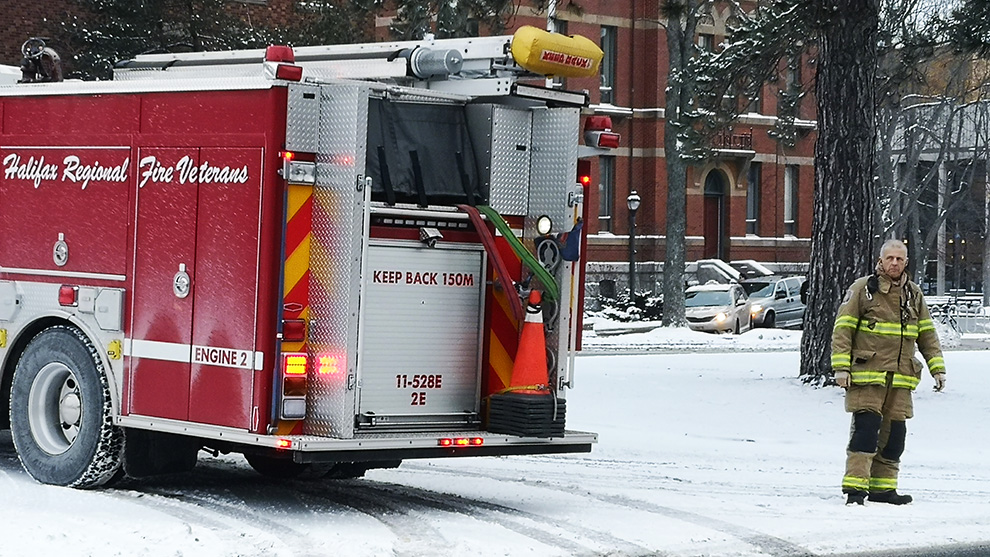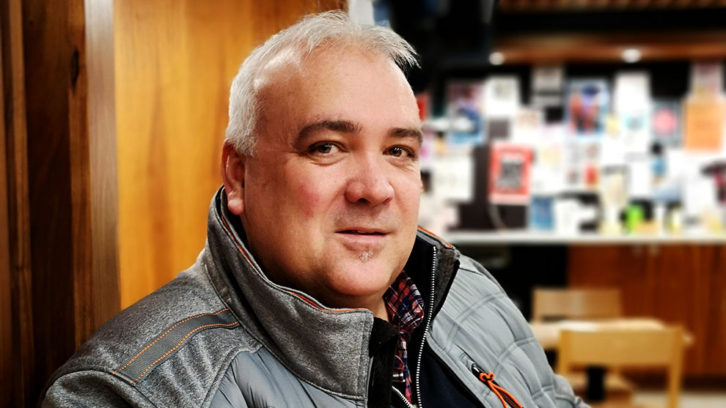New website in the works to help Nova Scotia first responders with PTSD
Workers’ Compensation Board of Nova Scotia working with first responders to create online resource

caption
A firefighter standing next to a fire truck on University Avenue, Halifax.A committee of first responders is working with the Workers’ Compensation Board (WCB) of Nova Scotia to develop a website providing resources for first responders fighting post-traumatic stress disorder (PTSD).
First responders, including paramedics, firefighters, and police officers, often witness traumatic events. As a result they are especially prone to developing PTSD. Twenty-two per cent of paramedics alone will develop the condition.
Dave Wilson witnessed the impacts of PTSD first-hand during his 10 years as a paramedic. The former NDP MLA for Sackville-Cobequid is now an advocate for first responders dealing with PTSD. He knows what can happen if a first responder’s mental health struggle is not addressed.
“I’ve attended too many funerals of former colleagues and friends who couldn’t get the help,” Wilson said in an interview. “They felt that suicide was the only way to put those demons that they had away.”
Despite the urgency of the issue, accessing treatment for first responders struggling with PTSD in this province has been a challenge.
Prior to Oct. 2018, workers had to prove that their PTSD was work-related.

caption
Dave Wilson, former paramedic and NDP MLA.After a 2018 change to legislation, it’s now assumed that a first responder can develop PTSD over a period of time due to the traumatic nature of their work.
With that change, first responder PTSD reports to the WCB Nova Scotia increased. According to an email from the WCB Nova Scotia, they jumped from 54 reported PTSD cases between Oct. 2017 and Sept. 2018 to 141 reported cases between Oct. 2018 and Sept. 2019.
In addition to a system that made it difficult for them to report PTSD, a stigma around expressing mental health concerns has hindered first responders in getting help.
In recent years this attitude has started to change.
“You went and had a beer. You got drunk, or some people got high and tried to deal with it that way,” said Wilson. “We realize now that that’s not the way to address things that affect you at work. I think there’s much more increased awareness around workplace mental health.”
Just as PTSD can affect the personal lives of first responders, it can also impact job performance.
“You wouldn’t want a paramedic that is struggling with PTSD and having a lack of sleep, or struggling with comprehension and not out providing patient care,” said Michael Nickerson, president of the International Union of Operating Engineers 727, which represents the province’s paramedics and LifeFlight RNs.
Nickerson said that getting treatment takes a long time. He hopes that the website can help provide mental health resources to first responders more quickly.
“We need to somehow be able to cut down the time that it takes for these first responders to get access to the mental health care they need,” said Nickerson.
Even though dealing with PTSD has been a challenge for first responders here in Nova Scotia, Wilson is optimistic about the future.
“I think we’re seeing changes in education and the opportunity to have organizations reach out to first responders,” Wilson said.
In an emailed statement, WCB Nova Scotia said that “the goal is to provide accessible workplace tools and resources for workers, their families, and employers in emergency response organizations, in a manner that helps reduce stigma.”
The WCB Nova Scotia is using B.C.’s website as a model for their own. WCB Nova Scotia said that they chose this model because it “was developed by first responders, for first responders,” and because it’s recognized across the country as “a best-practice program.”
The WCB Nova Scotia put out a tender to find a company to design the website. That tender closes on Jan. 28, 2020.
About the author
Nick Cantar
Nick Cantar is a journalist for The Signal. He is curious about all kinds of stories. When not working, Nick enjoys being outdoors.
